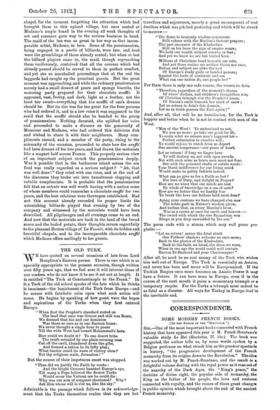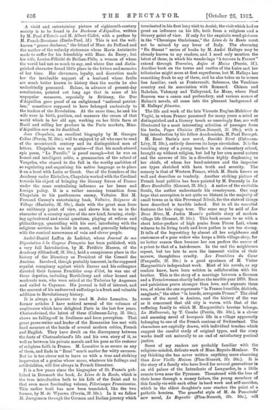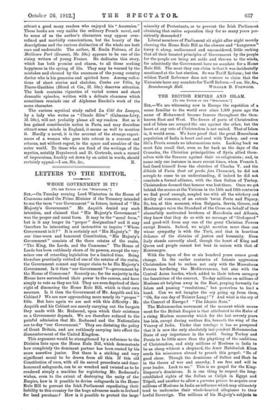CORRESPONDENCE.
SOME MODERN FRENCH BOOKS.
[To THE EDITOR or THE "SPECTATOR...1 Srn,—One of the most important books connected with French history that have appeared this year is M. Funck-Brentano's valuable study Le Eoi (Hachette, 7f. 50o.) The book was suggested, the author tells us, by some words spoken by a Belgian professor on what struck him as the greatest spectacle in history, "the progressive development of the French monarchy from its origins down to the Revolution." The ides was worked out by M. Funck-Brentano, and the result is a delightful volume dealing with the royal power as it rose out of the anarchy of the Dark Ages, the " King's peace," the doctrine of divine right, the popular side of monarchy, the King as the father of his people, the laws and customs connected with royalty, and the causes of those great changes in public opinion which brought about the end of the ancient French monarchy.
A vivid and entertaining picture of eighteenth-century society is to be found in La Duchesse d'Aiguillon, written by M. Paul d'Estree and M. Albert Callet, with a preface by M. Funck-Brentano (Emile-Paul, 5f.) This is not the well- known " grosse duchesse," the friend of Mme. du Deffand and the mother of the unlucky statesman whom Marie Antoinette made to suffer for his friendship with Mme. du Barry; but his wife, Louise-Felicite de Brehan-Plelo, a woman of whom the world had not so much to say, and whose fine and distin- guished character found little place in the letters and memoirs of her time. Her cleverness, loyalty, and discretion made her the invaluable support of a husband whose faults are much better known to history than the merits he also undoubtedly possessed. Balzac, in advance of present-day conclusions, pointed out long ago that in some of his unpopular measures, especially in Brittany, the Due d'Aiguillon gave proof of an enlightened "national patriot- ism," sometimes supposed to have belonged exclusively to the leaders of the Revolution. At the same time, he and his wife were in birth, position, and manners the cream of that world which in her old age, working on her little farm at Rueil and selling her produce in the Paris markets, Mme. d'Aiguillon saw on its deathbed.
Jean Chapelain, an excellent biography by M. Georges Collas (Perrin, 7f. 50c.), will be enjoyed by all who care to read of the seventeenth century and its distinguished men of letters. Chapelain was no genius—of that his much-abused epic poem, "La Pucelle," is proof enough—but he was an honest and intelligent critic, a grammarian of the school of Vaugelas, who shared to the full in the worthy ambition of so regulating and organizing his native language as to place it on a level with Latin or Greek. One of the founders of the Academy under Richelieu, Chapelain worked with the Cardinal towards his object of bringing the literary forces of France under the same centralizing influence as her home and foreign policy. It is a rather amusing transition from Chapelain to his posthumous enemy, Voltaire. But M. Fernand Caussy's entertaining book, Voltaire, Seigneur de Village (Hachette, 3f. 50c.), deals with the great man from an unliterary point of view, and shows him to us in the character of a country squire of the new kind, farming, study- ing agricultural and social questions, playing at reform and philanthropy, quarrelling with his cure, interfering with the religious services he holds in scorn, and generally behaving with the comical narrowness of vain and clever people.
Andre-Daniel Lefton de Ladebat, whose Journal de ma Diportaticrn a la Guyane Franfaise has been published, with a very full Introduction, by M. Frederic Masson, of the Academy (011endorff, 3f. 50o.), held a conspicuous place in the history of the Directory as President of the Conseil des Anciens. Involved, though probably innocent, in the supposed royalist conspiracy against which Barras and his colleagues directed their famous Fructidor coup d'gtat, he was one of those deputies, including Barthelemy and other honest and moderate men, who were seized at the Tuileries by Augereau and exiled to Cayenne. His journal is full of interest, and the account of his undeserved sufferings is a fresh and valuable addition to Revolutionary history.
It is always a pleasure to read M. Jules Lemaitre. In former articles I have noticed several of the volumes of conferences which have delighted Paris in the last few years. Chateaubriand, the latest of these (Calmann-Levy, 3f. 500.), shows no falling-off in liveliness and keen perception. That great prose-writer and leader of the Romantics has met with hard measure at the hands of several modern critics, French and English. They have dwelt on the discrepancy between the facts of Chateaubriand's life and his own story of it, as well as between his private morals and his pose as the restorer of religious faith in France. M. Lemaitre is as severe as any of them, and finds in " Rene" much matter for witty sarcasm. But he is too clever not to leave us with a true and striking impression of a genius whose name, whatever his failings and artificialities, will live always in French literature.
It is a few years since the biographer of St. Francis pub- lished in Denmark the book, Le Livre de la Route, which is the true introduction both to his Life of the Saint and to that even more fascinating volume, Pelerinages Franciscains. This earlier book has now been translated, like the two former, by M. de Wyzewa (Perrin, 3f. 50c.). In it we follow M. Joergensen through the German and Italian journey which terminated in his first long visit to Assisi; the visit which had so great an influence on his life, both from a religious and a literary point of view. If only for the exquisite word-pictures in the " Chronique Ombrienne," the Livre de la Route must not be missed by any lover of Italy. The charming "En fitment" series of books by M. Andre Hallays may be already known to my readers, and I need only mention the latest of these, in which his wanderings "O. travers in France" extend through Touraine, Anjou et Maine (Perrin, 5f.). Another book on the towns and castles of the Loire and her tributaries might seem at first superfluous, but M. Hallays has something fresh to say of them, and he also takes us to scenes leas familiar, such as Fontevrault, Solesmes, the Vendome country and its association with Ronsard. Chinon and Rabelais, Valencay and Talleyrand, Le Mans, where Paul Scarron was a canon and prebendary, and various scenes of Balzac's novels, all come into the pleasant background of M. Hallays' fidneries.
The life and work of the late Vicomte Eugene-Melchior de Vogue, in -whom France possessed for many years a mind so distinguished and a literary touch so unerringly fine, are well illustrated by a most interesting selection of passages from his books, Pages Choisies (Plon-Nourrit, 3f. 50c.), with a long introduction by his fellow Academician, M. Paul Bourget.
M. Rene Basin's new novel, Davidde Birot (Calmann- Levy, 3f. 50c.), entirely deserves its large circulation. It is the touching story of a young teacher in an elementary school, brought up without religion, but led by her own moral nature and the sorrows of life in a direction highly displeasing to her chiefs, of whom her head-mistress and the inspector are types sketched with keen truth and severity. The scenery is that of Western France, which M. Basin knows so well and describes so tenderly. Another striking picture of French local politics has been painted by M. Durandy in La Mare Ensoleillee (Grasset, 3f. 50c.). A native of the excitable South, the author understands his countrymen. One may hope that corruption is not quite so blatant in the majority of small towns as in this Provençal Neroli, for the state of things here described is terrible indeed. But in all its essential features the tale rings true. The same may be said of Les Deux Rives, M. Justin Masse's pathetic story of modern village life (Grasset, 3f. 50c.). This book comes to us with a. short letter-preface of high praise from Pierre Loti, whose witness to its living truth and keen pathos is not too strong. It tells of the boycotting by almost all her neighbours and customers of a poor widow who keeps a little village shop, for no better reason than because her son prefers the career of a priest to that of a hairdresser. In the end the neighbours repent, but too late to save the innocent victim of their narrow, thoughtless cruelty. Les Frontieres the C(eur (Fasquelle, 3f. 50c.) is a good specimen of M. Victor Margueritte's independent work. Most of his novels, as my readers know, have been written in collaboration with his brother. This is the story of a marriage between a German and a Frenchwoman shortly before the terrible year 1870. Race and patriotism prove stronger than love, and separate these two, of whom the one represents " la France humiliee, dechiree, sanglante," the other " la lourde, arrogante Prusse." The chief scene of the novel is Amiens, and the history of the war as it concerned that old city is woven with that of the suffering family to which M. Margueritte's heroine belongs. La Maltcrarnee, by T. Combe (Perrin, 3fr. 50c.), is a clever and amusing novel of bourgeois life in a village apparently belonging to one of the French cantons of Switzerland. The characters are capitally drawn, with individual touches which suggest the careful study of original types, and the story works itself out naturally to an end of satisfactory poetical justice.
Some of my readers are probably familiar with the religious-minded, delicate work of Mine. R,eynes-Monlaur. To my thinking she has never written anything more charming than Leur Vieille Maison (Plon-Nourrit, 3fr. 50c.). It is the story of a family who have lived for several generations in an old palace of the Intendants of Languedoc, in a little remote town near the Pyrenees. Threatened with the loss of their home through a money failure, the young members of this family vie with each other in hard work and self-sacrifice, which in the eldest daughter's case reaches the point of a pathetic heroism. The graceful style of M. de Pomairols' new novel, Le Repentir (Plon-Nourrit, 3fr. 50c.), will
attract a good many readers who enjoyed his " Ascension." These books are very unlike the ordinary French novel, and to some of us the author's characters may appear over- refined and morbidly conscientious, but the beauty of the descriptions and the curious distinction of the whole are both rare and undeniable. The author, M. Emile Poiteau, of La Meilleure Part (Grasset, 3fr. 50o.) appears to be one of the rising writers of young France. He dedicates this story, which has both promise and charm, to all those seeking happiness in the spring of life. They may be warned by the mistakes and cheered by the successes of the young country doctor who is his generous and spirited hero. Among collec- tions of short stories and sketches, Conies sur Min, by Pierre-Gauthiez (Blond et Cie., 3f. 50c.) deserves attention. The book contains vignettes of varied scenes and short dramatic episodes, written with a delicate clearness which sometimes reminds one of Alphonse Daudet's work of the same character.
The curious mystical study called La Cite des Lampes, by a lady who writes as " Claude Silve" (Calmann-Levy, 3f. 50c.), will not probably please all my readers. But as it has gained considerable notice in Paris, and may doubtless attract some minds in England, it seems as well to mention it. Hardly a novel, it is the account of the strange experi- ences of a woman who goes into retreat in a convent and returns, not without regret, to the space and sunshine of the outer world. To those who are fond of the writings of the mystics, notably Ruysbroeck and St. Gertrude, such a record of impressions, frankly set down by an artist in words, should certainly appeaL—I am, Sir, &c., E.




















































 Previous page
Previous page